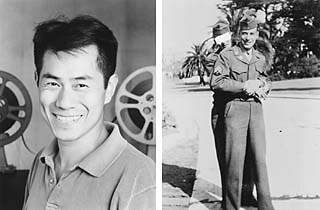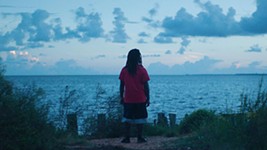The Boys in the Barracks
Texas Documentary Tour presents Arthur Dong's 'Coming Out Under Fire'
By Anne S. Lewis, Fri., April 4, 2003

It may not be readily apparent, but the timing of the Texas Documentary Tour's screening of Coming Out Under Fire -- L.A. doc-maker Arthur Dong's 1994 Peabody- and Sundance-decorated film -- couldn't be more perfect. Although the contentious gays-in-the-military issue and its peculiar "don't ask, don't tell" nonresolution seem so Clinton-era, so not on the front burner today, in fact it's still alive and, well, unsatisfactorily resolved. (The film opens with the 1993 congressional hearings, each member of the Joint Chiefs of Staff -- including Colin Powell -- opining that "open homosexuality is incompatible with military service.") Dong's film, made when the issue was Topic A, catapults us back to World War II for a look at the origins of the problem. And likely, after watching Coming Out Under Fire (based upon Allan Berube's book of the same name), you'll view the live footage from Iraq through a slightly different prism.
"I think all young men like to fight -- even gay guys," observes former Special Services Marine Tom Reddy, one of the nine gay and lesbian WWII veterans who, with wry, often bittersweet humor and insight, relate the experience of having patriotically volunteered to fight for their country, while essentially clueless about the military's new policy to exclude them. At the time, homosexuality was classified as a mental illness by the psychiatric community. Seeking to avoid a repeat of the psychiatric casualties of WWI, the government decided to pre-emptively screen for mental impairment -- including homosexuality -- at the enlistment phase and explicitly ask would-be recruits and draftees about their sexual preferences. Thus, gays were presented with the choice either to lie and attempt to pass as heterosexual or to be sent back home labeled "sex perverts." Gay recruits who somehow managed to slip through only later to be discovered were branded as criminals, psychopaths, or security risks and thrown into the brig or tossed out with dishonorable discharges, stripped of all veterans' benefits. More than 9,000 gays met this fate during WWII.
This, of course, being a time way before the dawn of gay liberation, many of these enlistees were not themselves aware of their homosexuality. And, because the implementation of the exclusion policy tended to vary with the level of homophobia in one's unit, Dong explains, "Some gay veterans, in fact, had a grand old time in the military -- the best they'd ever had, forming relationships. Others, in different circumstances, were devastated. Often it depended on the commanding officers."
The stories the veterans tell -- against the backdrop of terrific archival army footage -- range from the torment of avoiding discovery and the horrors incident to being discovered, to the exhilaration of enjoying a secret camaraderie beneath the radar of oblivious cohorts. The good times included participating in soldier shows, delightedly entertaining the unsuspecting straight GIs while in drag and discretely circulating a hilarious gay newsletter called the "The Myrtle Beach Bitch."
"A few were actually melancholy for that kind of secrecy," recalls Dong of his conversations with the vets. "It was like they had a secret club. They'll say, 'Yeah, it's great now; things are so much more open, and there's a level of liberation where you don't have to be hiding your identity all the time, but I kind of miss all that secrecy, where we had secret codes, where there was a wink of the eye or a nod of the head, or some signal, and then you knew that the other one knew, and then you got together later, you know.' It was kind of sweet actually, lamenting the old days."
A Women's Army Corps radio technician tells of her lover, a fellow WAC, who was chosen to be a spy and report homosexual activity. Of course, she found nothing to report. Marvin Liebman, another gay veteran, tells of meeting his first group of gay friends in the army and their hilarious practice of writing letters, addressing one another as "darling," in the Dorothy Parker "camp" vernacular. This was fun until the letters were intercepted, and Liebman was committed to a psychiatric ward and then given the boot with an "undesirable discharge."
Austin Chronicle: What would you say was the biggest challenge to making this film?
Arthur Dong: The archival footage -- finding it was a huge task. With the military footage -- most of it in the National Archives in D.C. -- the word "homosexual" or "gay" was never used on the record. And in 1992 and 1993, when I was making the film, very little was computerized so the indexes were all on the old-fashioned file-card system. At first, we couldn't find anything until we thought to look under "psychiatry," which was where homosexuals were dealt with -- as psychopaths and deviants -- but even there, there was no mention of the word "homosexuality." The closest was the word "sodomy." We finally found some images.
That newsletter, by the way, was a real find in terms of gay-lesbian history because, as far as we know, it was probably [one of] the first, if not the first, circulated gay paper. It wasn't The Austin Chronicle, but it was a circulated periodical. We knew about it, and we finally had to, using a FOIA request, go to court records of the court martial [of the veteran who published it], and there it was in the file. With this kind of archival work, you sometimes have to take the time and do what you have to do and be patient for the treasures that are out there.
AC: Has the "don't ask, don't tell" policy helped the situation?
AD: It's the same situation, it's still very prohibitive, though it's a different policy. It's kind of ridiculous. It's wink, wink; as long as you don't talk about it, or do anything about it, you're OK. But since "don't ask, don't tell" was created in mid-1993, it has actually created the mechanism for commanding officers to discharge and witch hunt suspected gay service members, which has actually led to more discharges, though one might expect there'd be fewer discharges, if it was truly a "live and let alone" policy, but it wasn't. Now, if the commanding officer, say, finds a gay publication in someone's trunk, that would be grounds for investigation, and that has happened. Some have been given honorable discharges but have still been stripped of all veterans' benefits. That's been happening more and more; it's really scary. It was supposed to have been a safety net, but it's become very scary.
AC: You're 49 and have been making documentaries for more than 25 years, and you're now a governor of the Academy of Motion Pictures in the documentary division. But you're known for your independence, as an independent documentarian. How have you earned that reputation?
AD: Well, I have been very adamant about maintaining my independence on the issue of distribution. Not only do I produce my films, but I also want to make sure they get out there. I have a clear concept of what works for my films, and more often than not that includes distribution in theatres before being broadcast on TV. With broadcast contracts, say, with HBO or PBS, they usually don't want you to do a theatrical run before the TV premiere. I have turned down funding if I'm not allowed the option of doing a theatrical run. I have this reputation of being stubbornly independent, but I'm not stupid. I'm not uncooperative. I just want the right to exercise that option. So yes, I take money from PBS and HBO, but I simply stipulate that I have the option to have a theatrical release if I want to do that. ![]()
Coming Out Under Fire will be presented as part of the Texas Documentary Tour on Wednesday, April 9, 7:15pm, at the Alamo Drafthouse Downtown (409 Colorado). Filmmaker Arthur Dong will introduce the film and conduct a Q&A session following the screening. Advance tickets are available online (www.austinfilm.org) for AFS members. Tickets will go on sale at 6:15pm on the day of the show. Admission prices are $6 per show for the general public; $4 for AFS members, KLRU members, and students. The Texas Documentary Tour is a co-presentation of the Austin Film Society, the University of Texas Radio-Television-Film Dept., The Austin Chronicle, KLRU-TV, and the Four Seasons Hotel.










